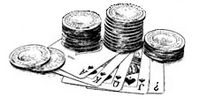And the hyper-rich get hyper-richer...
The Bush Economy
Remember "trickle down economics"? Well, we're still getting trickled on. Bush was elected in 2000, and re-elected in 2004, partially because he gave tax cuts to everybody. Most of us saw a $300 to $600 check in the mail, and that was enough to win him hearts and minds, thinking he was a man for all people.
In reality, he's a man for all hyper-rich people.
In last Sunday's Times, David Cay Johnston reported that from 1980 to 2002, the latest year of available data, the share of total income earned by the top 0.1 percent of earners more than doubled, while the share earned by everyone else in the top 10 percent rose far less. The share of the bottom 90 percent declined.
So not only do the rich get richer and the poor get poorer, but the really rich get really richer, leaving behind even those merely rich.
President Bush did not create the income gap. But the unheralded effect of his tax policy is its unequal impact on the modestly well to do. By 2015, those making between $80,000 and $400,000 will pay as much as 13.9 percentage points more of their income in federal taxes than those making more than $400,000, assuming the tax cuts are made permanent. Below $80,000, most taxpayers will see their share of taxes rise slightly or stay the same.
So now even those in the top twenty percent income bracket are being shafted by the tax breaks. Us poorer folks are feeling the pinch, but we always have, so it's nothing new to us. But now, people that we consider wealthy, making $200,000 a year in income, are finding it harder to save for retirement "in the manner to which they have become accustomed" and affording the cost of getting their children into "the best schools". We may have no sympathy for them, but it's scary to think that even if we strike it big in the lottery, we may be in the same boat.
There is something deeply wrong about a system that calls into question a comfortable retirement or a top-notch education for people who have broken into the top 20 percent of income earners. It starts to seem politically explosive when you consider that in a decade, those making between $100,000 and $200,000 will pay about five to nine percentage points more of their income in federal taxes than those making more than $1 million, assuming the Bush tax cuts are made permanent.
Maybe now it will get some attention, since rich folks are being shafted in the same way as us poor folks. Of course, proponents of the tax breaks will profess the benefits of pumping more dollars into the coffers of the wealthy.
But despite claims that by giving more money to rich people we invigorate the economy, we're discovering that the hyper rich, having more money than they can spend, are merely leaving it to their heirs, creating an aristocracy of lazy, obnoxious snobs. Imagine how our country will fare when Paris Hilton grows the other half of her wits and discovers lobbyists. More than Orlando will be covered in theme parks, that's for sure.
One way to understand the growing gap is to compare earnings increases over time by the vast majority of taxpayers - say, everyone in the lower 90 percent - with those at the top, say, in the uppermost 0.01 percent (now about 14,000 households, each with $5.5 million or more in income last year).
From 1950 to 1970, for example, for every additional dollar earned by the bottom 90 percent, those in the top 0.01 percent earned an additional $162, according to the Times analysis. From 1990 to 2002, for every extra dollar earned by those in the bottom 90 percent, each taxpayer at the top brought in an extra $18,000.
So while the rich got richer in the two decades from 1950 to 1970 by a margin of 162:1, they got richer in the last decade by 18,000:1. So much for the money trickling down. The drain appears to be clogged.
One reason the merely rich will fare much less well than the very richest is the alternative minimum tax. This tax, the successor to one enacted in 1969 to make sure the wealthiest Americans could not use legal loopholes to live tax-free, has never been adjusted for inflation. As a result, it stings Americans whose incomes have crept above $75,000.
The Times analysis shows that by 2010 the tax will affect more than four-fifths of the people making $100,000 to $500,000 and will take away from them nearly one-half to more than two-thirds of the recent tax cuts. For example, the group making $200,000 to $500,000 a year will lose 70 percent of their tax cut to the alternative minimum tax in 2010, an average of $9,177 for those affected.
But because of the way it is devised, the tax affects far fewer of the very richest: about a third of the taxpayers reporting more than $1 million in income. One big reason is that dividends and investment gains, which go mostly to the richest, are not subject to the tax.
But some of the wealthiest Americans, including Warren E. Buffett, George Soros and Ted Turner, have warned that such a concentration of wealth can turn a meritocracy into an aristocracy and ultimately stifle economic growth by putting too much of the nation's capital in the hands of inheritors rather than strivers and innovators.
Speaking of the increasing concentration of incomes, Alan Greenspan, the Federal Reserve chairman, warned in Congressional testimony a year ago: "For the democratic society, that is not a very desirable thing to allow it to happen."






0 Comments:
Post a Comment
<< Home